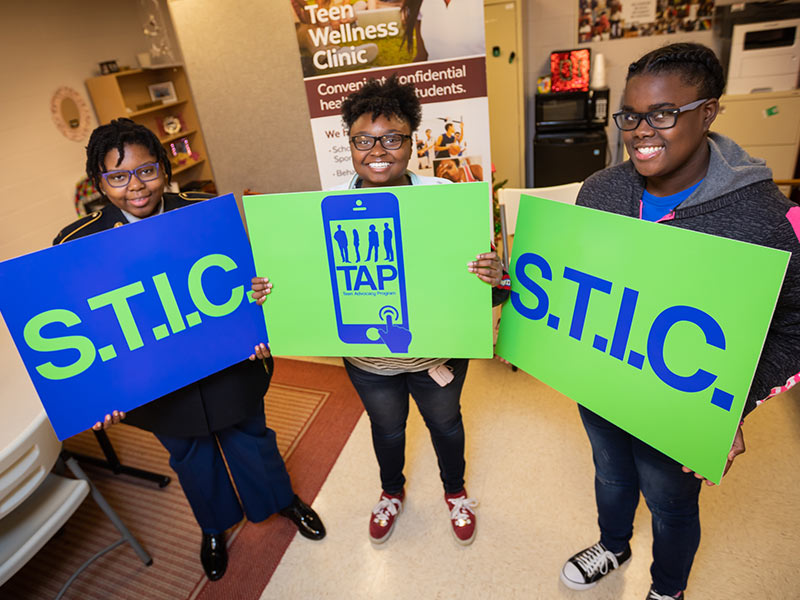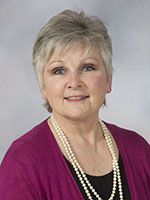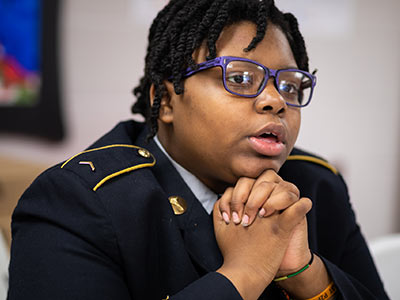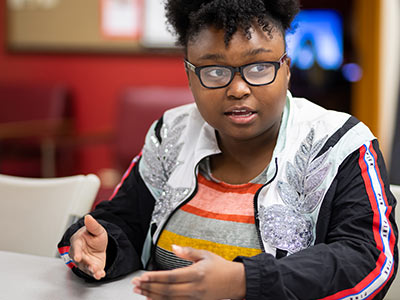New program teaches kids to stop, think before making risky decisions

The team at the Lanier High Teen Wellness Clinic was looking for a way to reach students who may need guidance but don’t qualify for a referral to the clinic for services.
“What happens to those kids who are almost there but not quite there?” Kate Fouquier, associate professor in the School of Nursing at the University of Mississippi Medical Center and director of the Lanier clinic, recalled thinking.
All students are screened for depression, anxiety, substance abuse and trauma, among other stressful events. Those who score above a certain threshold receive services from the clinic, but previously, those on the cusp “are just sent back into the classroom,” Fouquier said.

“What can we do for them?” she asked.
That’s when she found Prime for Life, an evidence-based motivational program designed for people who may be making high-risk choices.
Dr. Julie Schumacher-Coffey, a psychiatry professor in the School of Medicine, passed along the name of the program to Fouquier. It has been used in a number of settings, including on high school and college campuses, and is a prevention and intervention program for those who may be making high-risk choices, primarily related to substance use.
“I encouraged Dr. Fouquier to contact them to see if it might be a fit for her project because she was looking for a program that could be delivered by individuals who have varying degrees of prior experience with alcohol and drug prevention,” she continued. “It’s important to PRI (Prevention Research Institute) that their programs are delivered well, so in addition to providing very high-quality program materials and workbooks, they also provide extensive training and support to new instructors.”
Each instructor in the Lanier clinic had to complete a training and teach a class in front of students that was recorded and submitted to evaluators.

Fouquier blended the curriculum for Prime for Life with Safer Choices, an evidence-based risk reduction program that focuses on reproductive health, and also added behavioral health components.
“We also looked at things like suicidal ideology and bullying, and incorporated mindfulness in teaching them to be present within themselves and to try and make those decisions that protect the things they value,” Fouquier described.
Thirty-six high schoolers at Lanier participated in the pilot program in the fall semester in conjunction with their health class, and Fouquier and her colleagues are currently revising the course for the spring.

Ninth graders Tatiana Myers-Arterberry and Shakell James can rattle off statistics and facts from the course like walking encyclopedias.
“We learned about the different types of drugs and their effects – illegal, legal, over the counter and prescription,” James said. “… and depressants, stimulants, designer drugs, hallucinogens and opioids.
“Any drug can change your body chemistry from the way you think to how you look,” she continued.
Aside from a plethora of useful information and facts, the students also learned how to change the process they go through when making a decision. They all know “S.T.I.C.” by heart – an acronym for Stop, Think (or Take a breath), Imagine and Choose.
“I use ‘stop and think’ about the problem sometimes,” Myers-Arterberry said.

James recalls a time in 8th grade when she decided not to attend a party after her 8th grade ball. In retrospect, she had used the “S.T.I.C.” method to make the decision.
“Something bad happened (at the party) and I was glad I didn’t go,” she said.
She said the class also cemented her decision not to drink. “I’d already come to that conclusion, but the class made it for sure. We learned about drinking and how there’s a reason you shouldn’t drink until you’re 21, because your brain hasn’t developed yet,” she said. “That can really mess up your body and your brain.”
Amiracle Williams, a 10th grader at Lanier, also participated in the inaugural class. She said she’s used “S.T.I.C.” to make healthier food choices.
“I think it’d be good for the whole school to take (the class),” Williams said. “So they can learn something new, too.”
John Farr, a psychiatric mental health nurse practitioner in the School of Nursing who is part of the clinic’s team, got certified in Prime for Life and taught a class about suicide.
“From what we’ve used so far, I think it is very effective because it really meets the population that we serve,” Farr said.
The program is made possible by a grant from The Women’s Foundation.
While the class is still a work in progress, Fouquier’s goal is to eventually expand the program to other schools.
“Once we get it perfected, the goal is to get IRB (Institutional Review Board) approval so we can collect data and start presenting this within (other) schools,” Fouquier said.


